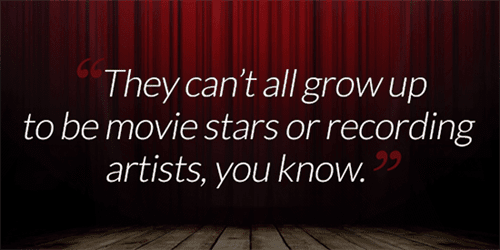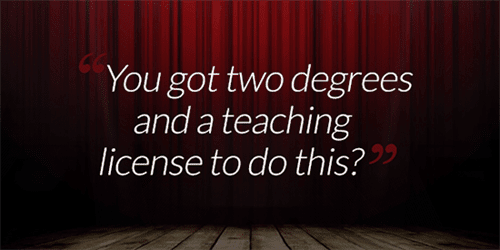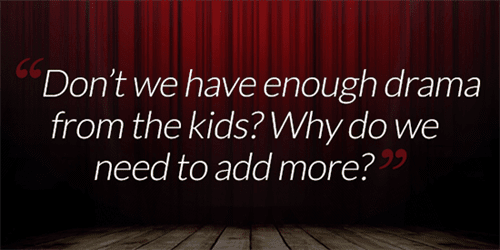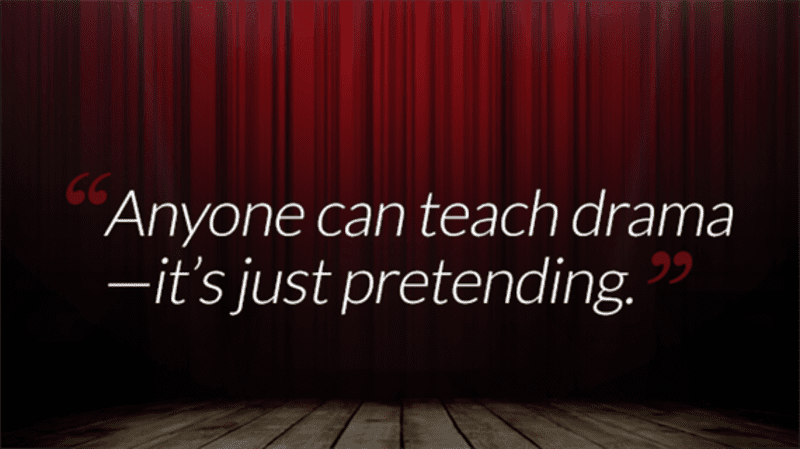There are the things people say to teachers … and then there are the things people say to drama teachers. It seems people overlook the fact that a little musical theater, in particular, can go a long way toward building student confidence, creativity and, yes, even Common Core mastery.
So the next time someone makes you cringe with a lowbrow comment about what you do, here’s how you can respond with wit and wisdom.
“Anyone can teach drama—it’s just pretending.”
You say: “It’s about more than pretending. When students walk a mile in another character’s shoes, they build empathy and expand their horizons.”
“Should students really be spending that much time in the theater? Wouldn’t the time be better spent on something more educational—like reading?”
You say: “Students spend tons of time reading in theater. They read and reread scripts for fluency and voice, dissecting portions for comprehension and analysis, so they will in fact be doing plenty of reading. And yes, they do need that much time. Students spend a lot of time with their scripts—reading closely and deeply to understand the characters and plot. Eventually, their understanding of story and character will help them create their performance—it’s reading comprehension in action!”

“They can’t all grow up to be movie stars or recording artists, you know.”
You say: “I wouldn’t want them to! Putting on a musical develops so much more than ‘stardom.’ In the weeks it takes to put on a show, kids learn how to collaborate, stick with a project, empathize and be creative. That’s a lot of 21st-century skills! Besides, the confidence boost they’ll get by participating in a show will transfer to other areas—think they’ll be shy presenting in social studies after they’ve played Simba in The Lion King JR.?”

“You got two degrees and a teaching license to do this?”
You say: “If you’re referring to how challenging it is to help a group of students understand complex narratives and work together toward a common goal, then yes, my education definitely helps.”
“How do you even lesson-plan? It’s just singing!”
You say: “It’s one thing to lead a sing-along, and quite another to plan for kids to create scenery and costumes or study a story that’s told through song. That’s probably why our lesson plans are so thorough—to tackle all the elements of the project.”

“Don’t we have enough drama from the kids? Why do we need to add more?”
You say: “Don’t worry, musical theater techniques can be applied to math and other disciplines. You can explore algebra through music theory, or biology through improvisation. For example, actors in The Lion King JR. could improvise a savannah scene: Which animal are they, and how will they interact with the other animals around them?”
“It must be nice to play pretend all day and not have to do the real-world stuff!”
You say: “Actually, there’s a lot of informational text and nonfiction learning that goes into one of our shows. The students research the backgrounds and settings, and depending on the part they play, they may research an animal or character too. For example, if a student is playing a slippery eel in The Little Mermaid JR., he can research marine life to develop the character. Or if a student is in Winnie the PoohKIDS, she’ll need to make calculations and measurements to build that famous trap that Pooh gets stuck in.”
“It must be so nice to not have to worry about teaching the Common Core.”
You say: “My students read and research the story and script and journal about the experience. They build language through domain-specific vocabulary for the play and the genre of theater. Kids explore math by designing sets and props, not to mention the counting and timing that goes into the choreography. And when they converse with peers and adults to form the show, they’re developing speaking and listening skills. I haven’t made an official list, but that seems to cover most of the Standards.”
“I’m sure theater is great for kinesthetic learners, but …”
You say: “Actually, the arts are good for all learners. Musical theater is inherently multi-disciplinary and appeals to all types of learners. Whether they are constructing a world, singing and telling the story, or bringing the show to life through choreography, kids develop a sense of storytelling in all its forms. They may learn through movement, art or music, but we’re reaching all kids.”
“That looks like so much fun.”
You say: “You’re absolutely right! It is!”
